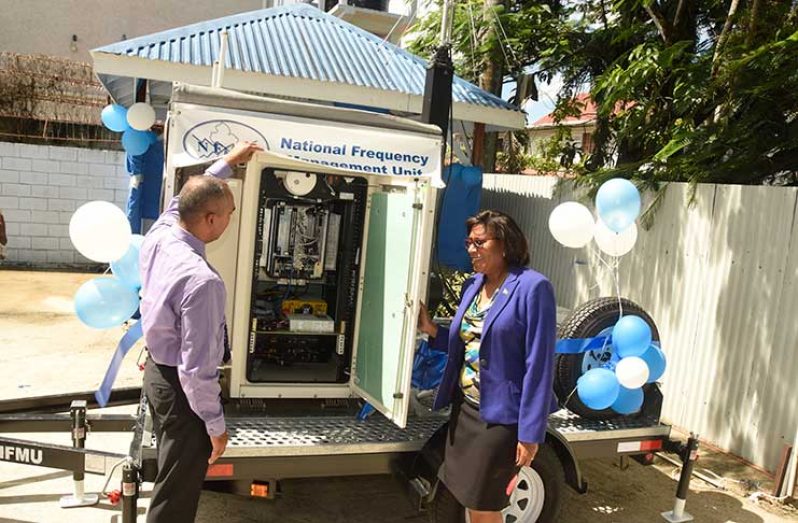–equipment geared at detecting, identifying illegal transmitters, among others
THE National Frequency Management Unit (NFMU) on Wednesday commissioned three specialised spectrum monitoring equipment valued US$563,873 to enhance its monitoring

Takuba Lodge
abilities and resolve issues in radio frequency management.
The three monitoring stations: a fixed station, a transportable station and a mobile station were commissioned at a simple ceremony at the NFMU office, Charlotte Street, Georgetown.
Speaking at the launch, Public Telecommunications Minister, Cathy Hughes said the equipment, among other things, are vital in curbing illegal use of spectrum.
“Spectrum as we know has a very important value and why this equipment and this development is so important for us in the Ministry, and of course, in our thrust to move the industry forward, is that for the first time we can measure accurately how that spectrum is being used (and) who is using that spectrum. We can bring transparency to the process, we can ensure that we reduce the illegal use of spectrum and since spectrum is a national resource, it belongs to the people and it belongs to Guyana. It is important to make sure that as a country we are able to garnish the best resources for the spectrum that is available to us,” Minister Hughes said.
The latest development in the telecoms sector is in keeping with the creation of a liberalised communications environment as outlined in the new Telecommunications Act.
The Ministry of Public Telecommunications, she said, is committed to setting higher standards in the industry as it moves into post-liberalisation.
“And it fits very well into the overall thrust of creating a liberalised environment… we have a new Telecommunications Act and under that Act a telecommunications agency is going to be established and the National Frequency Management Unit comes under that agency… We’re committed as an industry and as a Ministry in ensuring that as we go into this state – post liberalisation – that we’re going to be able to step up to the plate. And I think the demonstration just shows you the various and the different levels at which we’re going to monitor the proper and efficient use of spectrum,” Hughes said.
STRONGER
NFMU Managing Director, Valmikki Singh said his department now stands stronger in detecting and identifying illegal transmitters, among others.
“Some of the goals of radio spectrum monitoring include assisting in the resolution of radio frequency spectrum interference; assisting in ensuring an acceptable quality of radio and television reception by the general public; providing valuable monitoring data to support frequency assignment and spectrum planning functions; verification of proper technical and operational characteristics of transmitted signals; detection and identification of illegal transmitters; and verification of frequency assignment records,” Singh stated.
He said the three monitoring stations operate as an integrated system, communicating with each other.
One of the stations is fixed and is installed on the roof of the Ministry of Foreign Affairs, Takuba Lodge, while permission was given for another, a transportable station, to be accommodated in different police station compounds countrywide, at suitable times.
The other station, a mobile equipment, is installed on a 4*4 pick-up truck.
The fixed station will be used to monitor stations in and around Georgetown, while the transportable equipment, a trailer and integrated outdoor cabinet, can be deployed for weeks to any accessible area and operates as a satellite or a connected station.
Based on a schedule and demand, Singh explained that the transportable station is expected to be taken to many areas outside of Georgetown.
“The mobile station, which is retrofitted into one of our pick-up trucks, is geared for rapid deployment and can travel to any area a 4*4 pick-up truck can go,” the NFMU Managing Director said.
A special rack was designed and installed locally to accommodate the mobile equipment. They were supplied by TCI International Inc., a leading provider of innovative solutions in radio frequency monitoring. The company is based in Silicon Valley, California.
Singh also said services will be expanded as the need arises.
“As spectrum usage increases in townships and other areas outside of Georgetown, consideration for dedicated fixed sites would be made based on data collected.”
Six NFMU staffers were trained in use and maintenance of the equipment by a professional field engineer from the California company and TCI has also committed to lending support in fixing operational problems which may arise.




.jpg)










